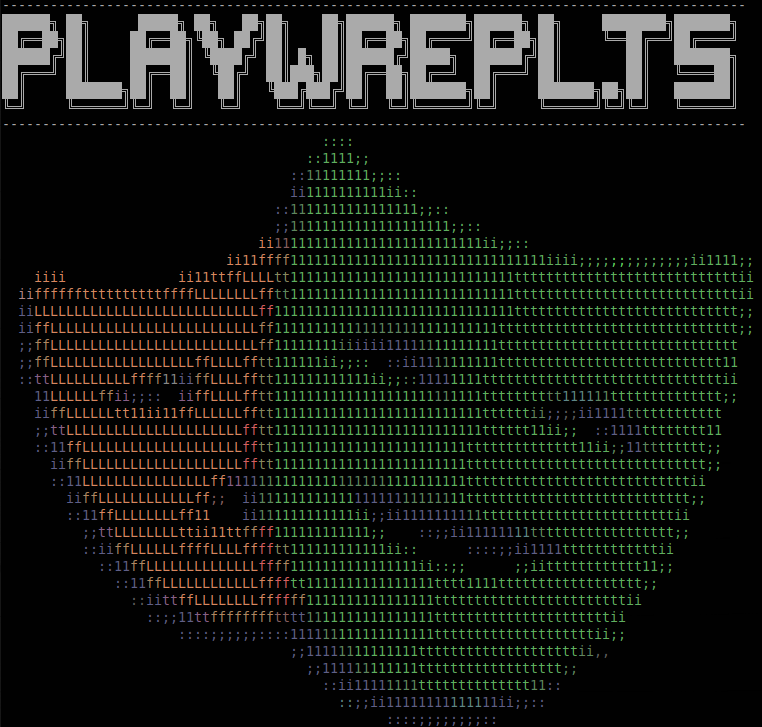Playwrepl.ts is quite simple node REPL server script that allow you controlling playwright from the command line using TypeScript code. When you start the tool in will open a node REPL server in the terminal and the open a chromium browser and expose some playwright object to the REPL server for interacting with browser using playwright api. playwrepl.ts is a node REPL server that utilizes ts-node repl service to compile Typescript code at runtime. The tool supports code completion using the tab key as well. Playwrepl.ts is a very handy tool when it comes to tryout slightly more complicated stuff than just picking a singe locator. It's a great tool when you are learning playwright because you can manually navigate browser to the place you want to explore and the start exploring different coding stuff from the command line.
- Clone this repo playwrepl.ts
- Run:
npm install - Run:
npx playwright install chromium - Start the tool by:
npx ts-node ./playwrepl.mts
If you use node version 20.x.x the you should start the tool by: node --loader ts-node/esm ./playwrepl.mts
There are some command line options that could be used when starting the tool:
$ npx ts-node ./playwrepl.mts -h
Usage: playwrepl.ts [options]
playwright by command line
Options:
-V, --version output the version number
-u, --url <baseUrl> The url to be opened by the browser
-e, --extraHttpHeaders <prop> extra http headers, use the format name:value (default: [])
-s, --storageState <path> path to storage state
-h, --help display help for command
The command line options --url, --storageState and --extraHttpHeaders reflects the baseURL, extraHTTPHeaders and storageState options when creating new browser context (see: https://playwright.dev/docs/api/class-browser#browser-new-context)
Playwrepl.ts have the normal node REPL commands but also two additional as well:
-> .help
.break Sometimes you get stuck, this gets you out
.clear Break, and also clear the local context
.editor Enter editor mode
.exit Exit the REPL
.help Print this help message
.load Load JS from a file into the REPL session
.save Save all evaluated commands in this REPL session to a file
.saveStorageState Save current storage state
.showLogo Show the amazing playwrepl.ts logo
Press Ctrl+C to abort current expression, Ctrl+D to exit the REPL
.saveStorageState will save the current sessions storage state and .showLogo will show some amazing console graphics :)
playwrepl.ts exposes several playwright object connected to the opened browser that could be used within the REPL:
browser- Browser object connected to the opened browsercontext- BrowserContext object connected to the opened browserpage- Page object connected to the opened browser pageexpect- see https://playwright.dev/docs/test-assertionsrequest- APIRequest to be able to do request outside the browser.
All of these object object is tied to the this object
playwrepl.ts store all the executed command in a .history file in the root of the repo and you can access history using the arrow keys within the repl.
Lets use saucedemo.com for a simple demo when we interact with the browser:
-> void await this.page.goto('https://www.saucedemo.com/')
-> await this.page.locator('[data-test="username"]').fill('standard_user')
-> await this.page.locator('[data-test="password"]').fill('secret_sauce')
-> await this.page.locator('[data-test="login-button"]').click();
-> await this.page.locator('.inventory_item').count()Lets do a simple rest request using the pet store sample site:
-> const reqContext = await this.request.newContext({baseURL: 'https://petstore.swagger.io/'})
-> const resp = await reqContext.get('v2/store/inventory')
-> resp.status()
200
-> await resp.json()
{
'3000': 1,
'5000': 1,
'6000': 1,
'7000': 1,
sold: 43,
string: 617,
unavailable: 7,
availeble: 1,
pending: 31,
available: 280,
avalible: 1,
bold: 1,
SOLD: 1,
Available: 2,
'Not available': 3,
status: 1
}We can create scripts and load these using the .load command from within the playwrepl.ts:
-> .load scripts/sample.mts
void await this.page.goto('https://www.saucedemo.com/')
await this.page.locator('[data-test="username"]').fill('standard_user')
await this.page.locator('[data-test="password"]').fill('secret_sauce')
await this.page.locator('[data-test="login-button"]').click();
await this.page.locator('.inventory_item').count()
... 6
- import within the repl do not work:
> import dotenv from "dotenv"
/home/stuffy/projects/playwrepl.ts/<repl>.ts:1
export {};
^^^^^^
Uncaught SyntaxError: Unexpected token 'export'
- node 20.x.x problem. If you are using node 20.x.x the you should startb the tool with:
node --loader ts-node/esm ./playwrepl.mts. See TypeStrong/ts-node#1997

